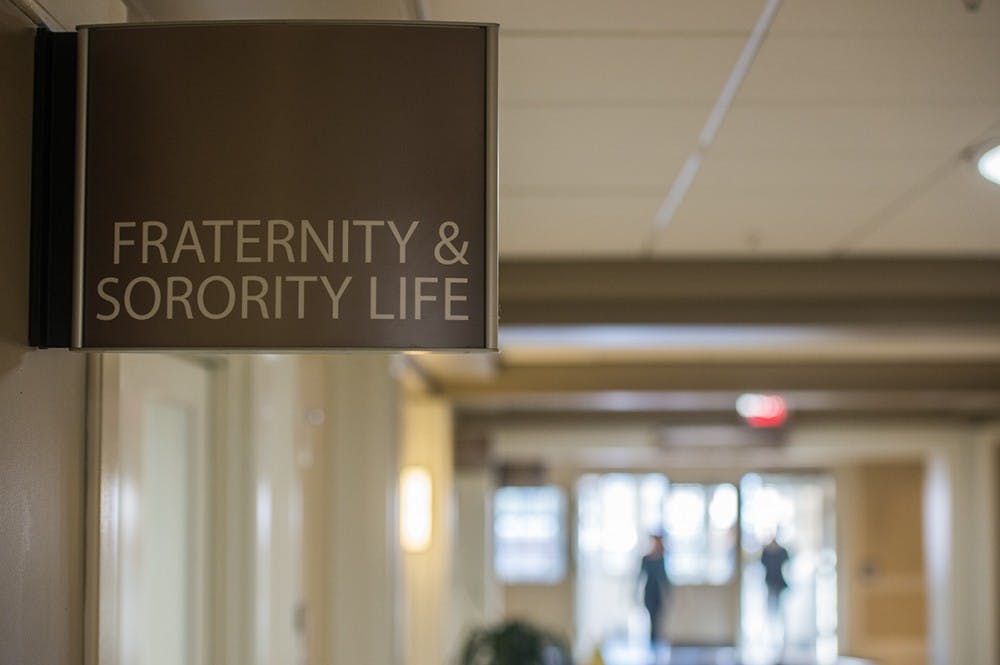La Sociedad de La Gente — an anonymous student group comprised of Hispanic and Latinx University students and their allies — circulated an open letter this week addressed to the Office of Fraternity and Sorority Life condemning their response to recent events of cultural appropriation in Greek chapters on Grounds. This statement follows the publication of an open letter last month from Native American Student Union entitled “Not Your Costume.”
Widespread criticism of the Kappa Sigma and Phi Kappa Psi fraternities and the Zeta Tau Alpha sorority arose after images circulated on social media depicting members taking part in cultural appropriation practices during chapter-sponsored events. The letter said the recent events “have further stigmatized marginalized groups” on Grounds, adding that the controversy has “shed light on our ongoing struggle to address our troublesome past of racism and cultural appropriation.”
A recent examination of copies of the University’s Corks and Curls yearbook — named for a reference to blackface, according to The Washington Post — has renewed awareness of historical racism in the University’s Greek system. Images of a staged lynching at the Chi Psi fraternity in 1971 and Phi Gamma Delta fraternity members arriving at a party in blackface in 1972 are a small visualization of numerous other instances where fraternity members were shown engaging in racist behavior during social events. In 2002, the Kappa Alpha fraternity was briefly suspended by both the IFC and the national organization for an instance of blackface at a Halloween party.
The examination follows the admissions of Gov. Ralph Northam (D-Va.) and Attorney General Mark Herring (D-Va.) to wearing blackface during college. The letter also called for Northam and Herring’s resignations from state office, adding that a demand for their leave paralleled their “demand for repercussions for members of these Greek organizations at our University who engaged at hateful behaviors aimed at minority groups.”
FSL received direct criticism in the letter for an apparent lack of equitable treatment of sorority and fraternity chapters in the Inter-Fraternity and Inter-Sorority Councils and the Multicultural Greek Council — an organization consisting of seven minority and multicultural fraternities and sororities — saying that the University appears to overlook offenses by IFC and ISC chapters.
“While the Office of Fraternity and Sorority Life seems to disregard actions taken by these IFC and ISC Greek organizations, they continuously target organizations under the Multicultural Greek Council,” the letter read. “It appears that the Inter-Fraternity and Inter-Sorority councils appear to receive special privileges, whereas smaller chapters under the Multicultural Greek Council are used as targets for excessive discipline.”
Zeta Tau Alpha was recently sanctioned by national headquarters after failing to comply with national standards on new member education. The sorority is being required to complete “educational programming on new member education, alcohol and multicultural competency,” according to the FSL website. Kappa Sigma and Phi Kappa Psi were not included in the group of eight fraternities that received sanctions in spring 2019.
The letter referred to the March 2018 suspension of Sigma Lambda Upsilon — a Latinx sorority in the MGC — over hazing allegations, condemning the suspension as “flawed” and “disgraceful” when FSL did not seem to take similar punitive measures with IFC and ISC chapters.
“If there are sanctions being placed to address these behaviors, then they should be shared with the University community to ensure transparency and to make certain that this conduct is not tolerated,” the letter said.
The group implored FSL to take three courses of action to rectify the situation — directly condemning the recent cultural appropriation, increasing education on cultural appropriation and directly involving a member of the MGC in FSL affairs.
FSL Dean Hal Turner said in an email statement to The Cavalier Daily that FSL has been working with the involved chapters to encourage them to incorporate cultural awareness education into chapter events and that chapters have thus far been responsive.
“In collaboration with these partners, Fraternity & Sorority Life staff strongly encouraged each organization to pursue cultural sensitivity training to better understand the negative impact these types of actions can have on our community,” Turner said. “Each organization has been supportive of these suggestions and has either already completed training or is in the process of coordinating future trainings.”
Turner also said that FSL has been working with minority student groups on Grounds to establish more direct and open communication lines between the two sides.
“In the spirit of student self-governance and advocating for an inclusive community, Fraternity & Sorority Life Staff have engaged in conversations with the student leadership of the Native American Student Union (NASU) and Latinx Student Alliance (LSA) to hear concerns and discuss potential future initiatives on cultural sensitivity education for the Greek community moving forward,” Turner said.
University President Jim Ryan commented on the recent cultural appropriation during an interview with The Cavalier Daily, saying that creating solutions to cultural appropriation are “some of the hardest judgment calls.” While Ryan said that administrators have talked in depth about the issue, Ryan also noted the importance of student self-governance and the need for involved student groups to work through problems without complete administrative oversight.
“I appreciate the wisdom, especially at a place like U.Va. that is so dedicated to students’ self governance, that anytime something happens that's objectionable, I don't think it would be wise for the administration stepping in and stepping in and stepping in,” Ryan said. “Sometimes the best thing to do is help students resolve the conflict or respond to the issue in one way or another. It doesn't mean that the administration should always step back and let students take care of it … I will tell you these are sometimes hard judgement calls.”
This article has been updated.





